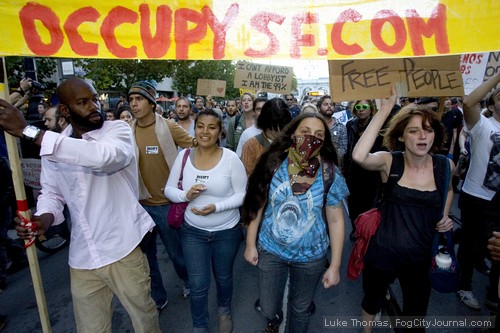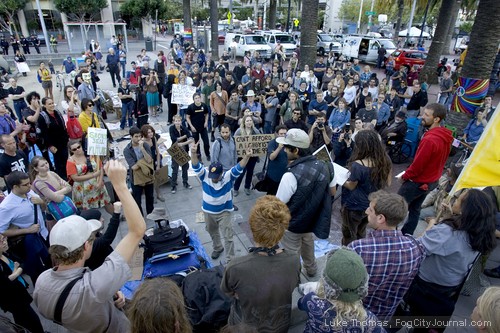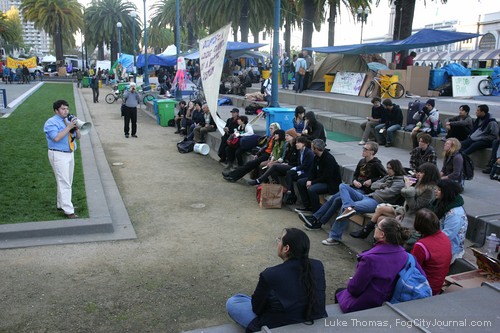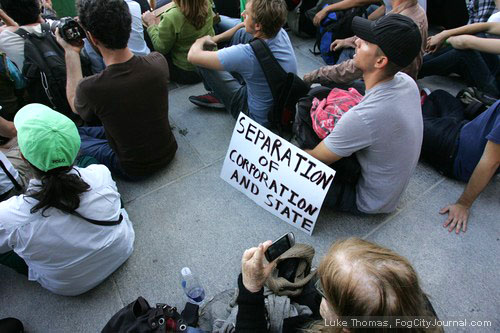
Photos by Luke Thomas.
By Christopher D. Cook (First published in SFPublicPress.org. Republished with permission)
October 21, 2011
“I think we’re witnessing possibly the biggest left populist rebellion since the populist movement of the 1890s.”
On a recent warm early morning in downtown San Francisco, veteran organizer David Solnit uttered those hopeful words amid a boisterous crowd of about 400 marching through the Financial District demanding banks pay for the economic and human costs of the home foreclosure crisis.
The Oct. 12 protest temporarily shut down Wells Fargo headquarters on Montgomery Street, leading to 11 arrests as demonstrators from a coalition of labor and community-based groups, including affordable housing and immigrants’ rights movements and the Occupy San Francisco movement spent five hours rallying to “foreclose on Wall Street West.”
Beyond the slogans and chants, what is this occupation movement about and why is it catching like wildfire? What do the growing ranks of Occupy Wall Street/San Francisco/fill-in-the-blank hope comes of this tempest of progressivism?
Since a handful of protesters “occupied” Wall Street in mid-September to protest corporate power and economic inequalities, an international movement of sorts has risen up, with marches and encampments in hundreds of U.S. cities and towns and protests across the globe. Last Saturday, protesters in more than 900 cities throughout Europe, Africa and Asia rallied in sympathy with their American counterparts, The Washington Post reported.
“I’ve never seen anything like this in my life,” said Canadian author and social activist Naomi Klein in an interview at the Wells Fargo rally in San Francisco. “People are so excited to have a new tent in which to meet, and the possibility of it expanding limitlessly. Political courage is so contagious.”
In a speech to the crowd, Klein said, “This is an incredible moment in this country. It turns out there is a lot of latent radicalism just waiting to be woken up. There are way more of us than we thought.”
Of course, not everyone is onboard. At the Wells Fargo protest, bank employees stood on the fringes of the boisterous rally waiting to get inside to work. Some expressed resentment that their entrance was being blocked. A couple of employees whispered their support for the message, if not the occupation of their workplace. Another said the protesters were “misinformed” about the economy and should “just get a job.” Some media critics have decried a lack of focus or coordination to the varied protests.
Culture of consensus
But at the core of the Occupy movement, participants said, lies a democratic culture of consensus that is as important as any list of demands. Solnit, a veteran organizer who helped mobilize protests against the WTO in Seattle in 1999, said the movement is “very horizontal and open, and they have created a space where huge numbers of people feel comfortable and have ownership.
“There’s not some board of directors or paid staff person running everything,” he said. “There is a process of direct democracy in the face of a failed democracy.”

OccupySF participants hold general assembly meetings daily. Decisions are reached through consensus.

OccupySF protesters partcipate in literary readings and motivation speeches.
Numerous Occupy San Francisco backers said they were drawn by the chance to create a culture in which everyone could speak and be heard.
“It’s leaderless, it’s spontaneous — that’s what I love about it,” said protester Robyn Kralique, who wants to help create a “sacred, safe open space where we can discuss the possibilities together and actually have a say and democracy, even if it’s just a block of people having free discussion and say about their politics. In America the average person doesn’t get their say, because it’s controlled by money.”
Charmz Valentino, who came to the city for the Hardly Strictly Bluegrass festival and has since hunkered down with her dog at Occupy San Francisco, said, “It’s so amazing that there is such a large range of ages, occupations and views, and we are all coming together to support our consensus.” Asked how long she planned on staying, Valentino, 26, said, “This is an indefinite occupation, and I will be here indefinitely.”
Jeff Weiss, a 33-year-old cafe worker who lives in San Francisco on “minimum wage, plus tips,” said he was inspired by “people coming together, communicating face to face, sharing ideas, ironing out those ideas and deciding collectively what’s in the best interests of all of us for the best possible intentions.”
Grievances — and proposals
Still, the question remains: What are those intentions? There is no single list of demands, but protesters have plenty of ideas about what is propelling the movement, and what they want changed. In dozens of interviews, their answers ranged from radical challenges to capitalism as a system to reformist proposals for corporate transparency and “fair taxation” of wealth.
The clarion call of “We are the 99 percent” has driven home a blaring message about what protesters argue is a host of inequalities — of wealth, income, education, housing, economic opportunity, political clout, access to decent food and healthcare, and much more. Some protesters want to see corporate economic and political power reined in and others call for capitalism to be reformed, transformed or replaced. Proposals include enforcing existing regulations on corporate finance, breaking up corporate bank chains, creating a city-run municipal bank or expanding off-the-grid barter economies and alternative currencies.

Separation of corporation and state.
“A lot of things could be fixed if we provided free housing at every level, free education at every level, free health care for every level,” said Valentino, whose puppy sported an “Occupy SF” button. “I am not comfortable with the fact that the Federal Reserve is owned by a private corporation. I would like to see that turned around as well. We need a big change in our financial institutions.”
Ken Tray, a teacher and union leader with United Educators of San Francisco, added: “If there is a clear message here, it’s that there is a radical redistribution of wealth upward, and it’s beginning to hurt people on the ground. I think the message is the rich have to pay their fair share and the public sector is something worth defending.”
Despite working in a job “related to the financial industry,” Mike, a clean-cut 40ish man who would not give his last name, joined the protests in front of the Federal Reserve building. “Banks got priority treatment and the rest of us, the 99 percent, got the recession,” he said, holding a sign at the corner of Market and Main streets. “I’m not against their existence, I’m against the idea that we should be subservient to them. They should be serving us.” Mike’s proposal: “I’d like to see a strengthening of the regulatory environment to keep another recession from happening. The best way to do that is to break up the banks. I’d also like to see a strong Volcker Rule — make sure they can’t use our money to gamble for their own profits.”
Asked what drew him into the streets, 52 year-old Francis Walsh, an assistant special education teacher from Daly City, said: “It’s right here in the sign — end the wars, tax the rich, care for the people and protect the environment. Four simple ideas, not easy to do, but the simplicity of it and the message behind it is what brought me out here.”
Walsh said he hoped for “a steady building activism moving toward a more equitable society, moving toward a better redistribution of the goods and services that we have and the financial power that we have. The skewed finances that we have, popularized by the 1 percent controlling the 99 percent, is ruinous for all, and actually will be ruinous for the people at the top as well.” Walsh said he did not know if his vision would materialize anytime soon, “but if people don’t speak out, if people don’t march, it never will.”
‘Something completely new’
Many of the protesters called for something beyond reform. “The issue goes beyond our government is messed up,” said Lauren Phillips, a 23 year-old San Francisco City College student who is taking time off from her studies because “there is traveling to be done, and revolution to make.”
Phillips, who has been camping and protesting for weeks, said it’s about more than just the economy: “If we don’t have an environment to prosper in, there is certainly not going to be prosperity anymore — there won’t be any people left to prosper if there is no environment in which to have health. That’s why this thing is so big and so hard to define, why we don’t necessarily have the answer of what to call it. I think it needs to be something completely new.”
Calls by the news media for a unified policy platform frustrated many protesters, who said it would only narrow the discussion they are trying to open up.
Desean Ricardo, a dread-haired rap musician who came from Pinole to protest along with his wife and baby daughter, explained: “The mainstream media keeps asking us for our list of demands, but that’s kind of trapping the movement in a corner. They want to hear our fixes to the system, but the system can’t be fixed.”
Some protesters pointed the finger at capitalism itself — arguing it should be replaced or dramatically amended.
In her speech in front of Wells Fargo, Klein argued, “Capitalism destroys the systems on which it depends, it destroys the people who can no longer afford to buy its products, it destroys the rivers and the air. This is an insane model and it has to stop.”
Walsh, the special education teacher, said capitalism is undermining itself.
“Capitalism is riven with contradictions,” he said, “and I think the contradiction that’s going on here is, the more you skew the income and property ownership to a small number of people, the more the system actually ends up destroying itself. If the people at the bottom aren’t well off — they don’t spend money, they don’t have jobs, they don’t get the services — eventually that starts working its way up and starts eating away at the people who benefit at the moment.”
Capitalism ‘an unsustainable model’
“Plato,” 24, a self-described “anarchist at heart,” argued capitalism is “an unsustainable model because it depends on growth. It has to keep producing more value just to repay debt … exponential growth is unsustainable in a planet of limited resources.” Like other younger protesters interviewed, he advocated alternative currency systems and new cultures of barter and sharing as a partial remedy.
Regardless of what “ism” they endorsed, for many embracing Occupy San Francisco, the simple chance to speak their minds without media or political filters was a victory.
“The most important thing is that the dialogue is no longer being controlled by the news,” said Jason Ohdner, a nurse from Phoenix who came to help train street medics and support the protests here. “They don’t have to let external forces decide for them which words are going to be bad words, so people are standing up and saying words like socialism, and they are not flinching.”
Some spoke of a cultural shift that goes beyond lawmaking. “I think what we’re trying to do here is more than just change a few laws and end the Fed, but at the same time create a new kind of culture and community where people love,” said Phillips. “It’s about bringing people back together in conscious community, practicing that and showing that it’s possible, that people can love and engage thy neighbor.”
For Kralique and others interviewed, the movement goes beyond a list of demands.
“There are just so many demands, because there are so many crises going on right now that it’s hard to boil it down to one cohesive statement,” she said. “I don’t even think we should be forced to do that. We should be able to band together and discuss the possibilities.”
Christopher D. Cook is an author and award-winning investigative journalist who has written for the Los Angeles Times, Harper’s, The Economist, Mother Jones, The Christian Science Monitor, and other national publications. He is the author of the 2004 book “Diet for a Dead Planet: Big Business and the Coming Food Crisis” (New Press), and is a former city editor for the San Francisco Bay Guardian. He has also worked as a reporter for The Oakland Tribune and United Press International. His Web site is www.christopherdcook.com.


 The Hunger Site
The Hunger Site
October 25, 2011 at 7:15 am
Occupy Oakland attacked by police this morning: http://www.rawstory.com/rs/2011/10/25/watch-live-occupy-oakland-attacked-by-police/
Another reason to come out today if you agree that the Keystone Pipeline is an environmental threat. Let Obama know on his SF visit today at the W Hotel, 3rd and Howard: http://act.credoaction.com/event/events/event.html?event_id=2304
For more info on the Tar Sands: http://www.tarsandsaction.org/josh-fox-arrested/
October 25, 2011 at 5:26 am
Cook errs here because he conceptualizes this in terms of a leftist activist, trying to shoehorn a populist movement into a failed model. This activist-centered approach is, at least from where I write here in NYC where I slept in Zuccotti Park the previous night, overwhelmed by an influx of youth not tainted by the toxic cold war era failed politics.
There is a Marxist test in the works here, however. In the preface of “A Contribution to the Critique of Political Economy,” (1859), Marx wrote:
“In the social production of their existence, men inevitably enter into definite relations, which are independent of their will, namely relations of production appropriate to a given stage in the development of their material forces of production. The totality of these relations of production constitutes the economic structure of society, the real foundation, on which arises a legal and political superstructure and to which correspond definite forms of social consciousness. ”
In five words, my take is that Occupy seeks to “evict finance capital from government.” This would suss out whether in capitalism, the political and legal structures that arise from the base can be separated from the logic of the base. Can capitalism exist as an economic form without capital owning and running politics and the law?
Occupy, thus, issues an ultimatum to capitalism: prove Marx wrong, divorce politics and the law from capitalist economics.
To the mind of this grizzled “veteran progressive activist,” the best way for that question to be called is for all of us who are older than 35, who have tried our hardest but met with much more failure than success, to step aside in favor of emerging youth leadership that is not tainted like we are with cold war era baggage and to support their success.
We can teach them how to avoid the pitfalls that hobbled us, such as cooptation from the constellation of power surrounding the Democrat Party, labor and nonprofits as well as the ever toxic sectarian left not to mention the FBI. The difference between the 10/12 foreclose on Wells Fargo action, where labor and the nonprofits read from the stale playbook and saw numbers drop from 1000 to 100 after the PA screeched a litany of grievances of every ethnicity and identity, a study in highlighting powerlessness and the glorious 10/15 march with 10000 people uniting that showed us powerful says it all.
On 10/12 PA screechers never once said “Join us,” rather reiterated the you are racist/sexist/homophobic/classist prejudices that one can ascertain an individual’s politics based on appearance of race, class, gender or queerness, giving everyone a reason to feel alienated.
The insistence of failed progressive activists to hijack the successful Occupy meme in favor of decolonize is another example of activist-centered campaigns. Occupy and the 99%/1% memes are successful where decolonize appeals to me and a handful of stalwarts, not to the broad majority to whom the Occupy/99/1 memes do. Christopher Cook represents that failed activist culture that cooks up bright ideas (remember the community congress from last fall?) to mobilize people to support the failed nonrprofit model of progressive politics, only to never follow through with mobilized organizing to even attempt the heavy lifts, like a Bank of San Francisco.
The magic of Occupy is that the activists are behind the people and that is why it is successful. Smart activists need to be putting the stale activists in a box if they cannot realize what’s going on and put themselves at the service of emerging collective leadership.
Redemption is a powerful narrative, and I would insist that the old school leftists to “Repent! the beginning is near,” to sit at the feet of the youth who are at the forefront of this amazing movement to learn a thing or two about successful populist organizing in the post-left 21st century.
October 24, 2011 at 8:20 pm
Avalos at El Rio.
Good job tonight Chris, mile gracie. Good to meet you.
AVANTE ALCALDE AVALOS.
SI SE PUEDE.
October 24, 2011 at 4:19 pm
Thanks, Chris. What a beautiful thing we’re witnessing. I am reminded of one of the best teachings I got at art school: at the beginning of the semester, this teacher let us students know not to “try” too hard in the beginning… He used the analogy of a dancer. He said: if you were a dancer who hadn’t danced in a long time, you would start slow and easy. You wouldn’t push yourself too hard, else you’d pull a muscle. This is the time to “play”…and trust (“trust”–another good lesson from another teacher) that something will come of that.
I trust that we are definitely on the right track here. I’m not worried, and get the feeling from what I’ve witnessed that this movement knows how to start…and stay the course.
October 22, 2011 at 7:00 am
Occupy Oakland refused to move in response to the city’s order last night: http://www.cbsnews.com/8301-500188_162-20124129/occupy-oakland-defies-vacate-orders/.
October 21, 2011 at 11:28 pm
COME ON COMPANEROS.
LETS RE -ENERGISE FOG CITY.
LUKE CANT DO IT ON HIS OWN
FUCK SFBG AND THE TROLLS
WE NEED A PLACE TO CONVERSE
A NEW AMERICAN AGORA
FOR ALL WHO CARE ABOUT SF
FROM TONY HALL TO FRANCISCO DaCOSTA.
CONTRIBUTE, POST AND COMMENT HERE
LET’S RAISE SOME HELL AND KICK SOME ARSE.
To the best of my limited knowledge no sentient beings, animate or inanimate, were harmed, used or abused in the creation of this or any other of my utterances on this site, except maybe my liver.
All rantings; ravings; outlandish conjectures and suppositions; flights of fancy or fantasy; assumptions drawn and dubious conclusions reached; blah, blah,blah, are strictly the product on my fevered and increasingly senile imagination.
The editor and publisher of this site is ‘old school’, honorable, conscientious and law-abiding; but also a fierce advocate for the right of Free Speech and a Free Press and holds an unwavering belief that these are two of the most essential ingredients needed to keep the stewpot of Democracy simmering, at least that what he told me over a few beers recently.
I accept full responsibility for all and any, real or imagined, supposedly libelous or actionable personal statements that may appear here under my name despite the publisher’s best efforts to edit them out, with one proviso, I do not accept that Corporations are people. So sue me. Then try and collect. You want a few Japanese chisels.
Copy-write (right) either/neither makes no/sense to me. I personally make no, neither do I assert any claims to any of the drivel that may appear here under my name; though the publisher has my permission to do what he will that is my law.
As Gibrie says “The moving hand writes, and having writ, moves on”.
‘”Fugghedabooudit, wassup next brah”. I said that. So..
Plagiarise-Bastardise-Deconstructivise-Commercialise
-Revise-Homogenise-Denigrise-Generalise-Venalise- ’til you heart is contentivised; frankly m’dear I don’t give a damn.
I would like to acknowledge here and now that this was a totally pretentious and self indulgent posting, I doubt that more than ! or 2 people will ever read it, if that many, I hope Luke does. (it is basically a billet doux to you know who, of course you do, I just said who)